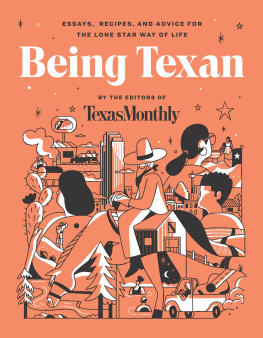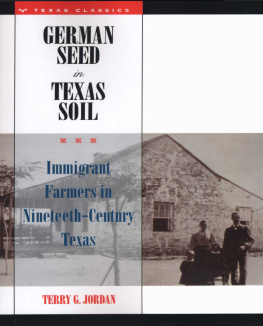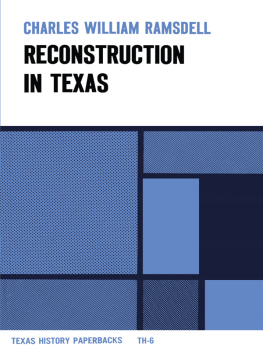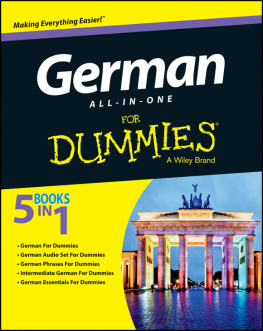Preserving German Texan Identity
Number 45
Elma Dill Russell Spencer Series in the West and Southwest
Preserving German Texan Identity
Reminiscences of William A. Trenckmann, 18591935
Edited by Walter L. Buenger and Walter D. Kamphoefner
TEXAS A&M UNIVERSITY PRESS
COLLEGE STATION
Copyright 2019 by Walter L. Buenger and Walter D. Kamphoefner
All rights reserved
First edition
This paper meets the requirements of ANSI/NISO Z39.481992 (Permanence of Paper).
Binding materials have been chosen for durability.
Manufactured in the United States of America
Library of Congress Cataloging-in-Publication Data
Names: Trenckmann, William A., 18591935, author. | Buenger, Walter L., editor. | Kamphoefner, Walter D., editor.
Title: Preserving German Texan identity: reminiscences of William A. Trenckmann, 18591935 / edited by Walter L. Buenger and Walter D. Kamphoefner.
Other titles: Erlebtes und Beobachtetes. English
Description: First edition. | College Station: Texas A&M University Press, [2019] | Series: Number 45: Elma Dill Russell Spencer series in the West and Southwest | Includes bibliographical references and index. | Identifiers: LCCN 2018021209 (print) | LCCN 2018026359 (ebook) | ISBN 9781623497149 (ebook) | ISBN 9781623497132 | ISBN 9781623497132 (printed case: alk. paper)
Subjects: LCSH: Trenckmann, William A., 18591935. | German American teachersTexasBiography. | TeachersTexasBiography. | German American journalistsTexasBiography. | JournalistsTexasBiography. | German American publishersTexasBiography. | PublishersTexasBiography. | German American legislatorsTexasBiography. | LegislatorsTexasBiography. | Agricultural and Mechanical College of TexasAlumni and alumnaeBiography.
Classification: LCC F395.G3 (ebook) | LCC F395.G3 T7413 2019 (print) | DDC 920.0092/310764dc23
LC record available at https://lccn.loc.gov/2018021209
Cover photo courtesy of Bellville Historical Society.
Contents
Illustrations
Tables
Preface
William A. Trenckmanns memoir, titled Erlebtes und Beobachtetes (Experiences and Observations), was first published in his Austin, Texas, newspaper, Das Wochenblatt , beginning with its fortieth anniversary issue on September 17, 1931, and continuing intermittently until the last installment on February 16, 1933. Two appendixes previously authored by Trenckmann present alternative takes on material covered in the memoirone of them dealing with his experiences at Texas A&M, originally written in English. These three documents, edited and annotated here, form the heart of Trenckmanns autobiographical work, his reminiscences of days gone by and of the people and major events in his life. They also provide a close look at Trenckmann himself, who, as a student in the first class of Texas A&M, a bilingual public schoolteacher, a German-language newspaper editor, and an office holder, served as a go-between who moved back and forth between the Anglo-dominated world of Texas and his culturally familiar German Texan world. As he says in his memoir, he was drawn in part to the newspaper business because he could better educate and inform his German readers about English-speaking Texas. Fluent in both languages, cautious, and even-tempered, he was in many ways an ideal person for this task. He sought to equip German Texans to operate as equal members in public life in Texas. Tellingly, however, he sought not to assimilate German Texans totally into the Anglo majority, but to preserve their distinctive identity.
As we wrote the introduction, prepared the annotation, and ensured we had the best possible translations of Trenckmanns autobiographical writings, the implications of our work for the history of German Texans became clear. Go-betweens such as Trenckmann helped German Texans adjust and even thrive in new surroundings and challenging times. Adjusting and thriving, however, did not mean total amalgamation into the Anglo world. As late as Trenckmanns death in 1935, German Texans remained separated by language and culture from Anglo Texans, and even the pressures of World War I had not erased the borders between the two groups. Anglos and German Texans, however, were not the only distinct groups in Texas, and Trenckmann also served as a go-between who helped negotiate German Texan attitudes and actions toward African American Texans. He proudly related how he encouraged German Texans to accept and support the exclusion of black voters from the political process. Take away then from Trenckmanns autobiographical writings an interesting and revealing story, but also remember the role of go-betweens, the persistence of a distinctive German Texan identity into the 1930s, and the reality that those German Texans grew closer to the dominant Anglo Texan model of white supremacy.
Trenckmanns revealing memoir was translated in the late 1950s by his children, retired lawyer William Trenckmann and German teacher Else Trenckmann. According to Williams grandson, Stuart Strong, who witnessed their work while visiting on summer vacation, they sat around a table working together on a handwritten version that Else then typed. Given their contextual knowledge and language competence, the present editors have generally trusted the accuracy of their translation. But wherever a passage sounded unidiomatic or ambiguous, we have gone back to consult the original German. Even Trenckmanns wife reproved him for his tapeworm sentences, and on rare occasions we split one that was too long and cumbersome. More frequently, we silently divided excessively long paragraphs at logical break points and modified punctuation to ease readability. Trenckmann started out providing section titles but omitted them in later segments, so we have adopted or adapted what his children provided. A couple of textual conventions should be noted: the German umlauts , , and have been rendered as ae, oe, and ue, respectively, as the translators did. Terms, often from English, that were in quotation marks in the original are rendered in quotation marks with the exception of Texas A&M . Instead of underlining or italics for emphasis, the German convention in Fraktur type was to print a word gesperrt , or with a space between each letter; these occurrences are rendered in italics.
The two editors divided the work of drafting the introduction and annotations according to our respective areas of expertise: Kamphoefner for matters of immigration, ethnicity, and the German language; Buenger for matters of politics, race relations, and economics. But we have read and vetted one anothers work and stand behind it all. The editors introduction was designed to place Trenckmanns life and career in context, particularly with respect to the family and community in which he grew up and the communities in which he spent his adult life and political work. Annotations were added to clarify unfamiliar institutions and references and, with people of German ethnicity, to distinguish between the immigrant and American-born generations in order to gauge the speed of acculturation or the persistence of ethnic culture and language. On a few rare occasions erroneous assertions required correction. For Trenckmann and his immediate family, full citations of census information was provided, but this seemed excessive for other persons. However, absent other documentation, one can assume information was obtained from US Census manuscripts, immigrant passenger lists, and other associated material such as Texas Death Certificates and unofficial data on Find-a-Grave.com, indexed and made accessible through ancestry.com. Except for Das Wochenblatt , newspapers cited were accessed through the Portal to Texas History of the University of North Texas Libraries.






